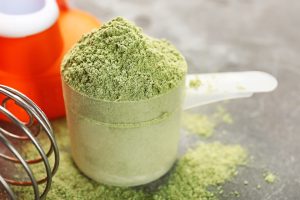Hi Everyone,
I am often asked, “Is AG1 supplement good for you?” And I have to say no! When I first saw it (I like to keep up to date with new products so I ordered a packet for myself) I was horrified by the ingredients. I was so horrified that I returned the product. Let me explain so you can learn how to spot problematic ingredients too.
What is AG1?
AG1 is a multivitamin and herbal powder formula that you mix with water to make a healthy drink. It is heavily endorsed by doctors and celebrities and marketed with phrases such as ‘Promotes Gut Health,’ ‘Supports Immunity,’ and ‘Helps Recovery.’
But the extensive list of ingredients doesn’t stack up to be as healthy as it makes out.
Are Supplements Safe?
Is AG1 Good or Bad for You?
The Risks of Taking AG1
Why the AG1 Ingredient Soy Lecithin Has Health Risks
How is Soy Lecithin Produced?
Is Inulin, Another AG1 Ingredient, Safe?

Are Supplements Safe?
Firstly, everyone needs to know that supplements are not FDA-approved (Food and Drug Administration). Supplement manufacturers are responsible for their products’ safety but do not need to prove their safety.
Nor do they need to prove the effectiveness of the supplements.
A supplement manufacturer may do business with another manufacturer who may verify the safety of their ingredients before they use them. But the other manufacturer does not have to prove the safety of their ingredients, either.
The Food and Drug Administration provides no safety certification for supplement formulas – or their ingredients, including
additives. Additives have never been rigorously tested.
For reassurance, I always advise using a trusted brand, like Minami or Solgar who extensively research their ingredients and products. You can see more brands I love and trust on my Yalda Loves page. However, no matter how good a supplement is, it cannot replace a healthy diet and lifestyle.
Also, please ask yourself what you want from your supplement. For instance, you can easily reach your weight loss goals, manage depression, ease pain, optimize energy levels, and discover glowing skin by following the EBS anti-inflammatory lifestyle! The effects are incredible, and they keep on coming!

What Do Supplements Contain?
Many popular supplements contain unnecessary excipients, fillers, stabilizers, bulking agents, and preservatives. A supplement company can get away with using cheap additives because they don’t have to comply with any food and drug laws. This lack of regulation and use of cheap filler ingredients is partly why supplement manufacturing is a billion-dollar industry!
It is essential to know what to look for in a good quality supplement and to spot cheap, unnecessary ingredients. I urge you not to be swayed by endorsements from doctors or celebrities or to buy things online without understanding the ingredients.
Is AG1 Good For You?
AG1 has been around for a while, is recommended by doctors, and has famous people as investors. So, there’s a lot to ‘trust’ about the brand. Endorsed by Dr. Chatterjee, Dr. Mark Hyman, Huberman Lab, and Dr. David Sinclair, it is not a surprise that their revenue numbers are apparently through the roof. Doctors are telling you that it is good for you.
AG1 was founded in 2010 and was originally called Athletic Greens. It is a blend of 75 vitamins, minerals, superfoods, probiotics, and adaptogens, with no GMOs, herbicides, pesticides, artificial colors, flavors, or preservatives. According to their website, AG1 is made from the highest quality ingredients under the strictest standards – but bear in mind that there are no strict standards in place by the FDA.

The Risks of Taking AG1
Supplements are huge money-makers, and the manufacturers don’t need to prove their safety.
Even when taking supplements from ‘reputable’ brands, it’s always wise to ensure that you go over the ingredients with your nutritionist or healthcare provider. This minimizes the risk of :
- Contraindications with medications or other supplements.
- Accidentally taking too much of a vitamin or mineral.
- Sensitivities to ingredients that are not classed as dangerous to health.
AG1 is full of active ingredients beneficial to health such as B vitamins, zinc, and vitamin C. However, this high amount of active ingredients may be difficult for some people to digest and assimilate. And many of the herbals have well-recognized potential risks. For example, too much licorice can lead to hypokalemia and hypertension and some people are more sensitive to licorice exposure (Kwon et al., 2020). There is no caution about this on their website, by the way.
The most significant problem I noticed within seconds of looking at the ingredients is soy lecithin.
Soy lecithin harms the gut microbiome (Miclotte et al, 2020) and may trigger gut dysbiosis. It is NOT good for gut health, the immune system, or aiding recovery. It does the complete opposite.

Why the AG1 Ingredient Soy Lecithin Has Health Risks
Soy lecithin is added to products as an emulsifier, not for health benefits. You could argue that AG1 is using it for this reason and the good ingredients will outweigh any harmful effects. But, soy lecithin is the second largest ingredient in the supplement!
Research is ongoing into the impact of emulsifiers like soy lecithin on health, but so far we know that:
- Higher levels of soy lecithin encourage Enterococcus and Clostridium bacteria in the microbiota. These are pathogenic and lead to disease.
- Soy lecithin is associated with a decline in the diversity of the gut microbiome (Miclotte et al, 2020).
- By disrupting the microbiome, emulsifiers contribute to a pro-inflammatory state and the development of Metabolic Syndrome (Miclotte et al, 2020).
Disruption of the gut microbiome leads to a dysregulated immune system, which leads to chronic inflammation. This manifests in different ways for each individual and can show up as alopecia, candida & H-pylori, depression, IBS, bloating, migraines, obesity, Metabolic Syndrome, skin inflammation – the list goes on!
So, if you have an inflammatory condition and you regularly take a supplement containing a large amount of soy lecithin, you could be making your condition worse.
A footnote at the end of the label states: This product contains a premium lecithin for phosphatidyl serine and phosphatidylcholine. The metabolism of phosphatidylcholine from soy lecithin in the gut microbiota has been linked to cardiovascular disease, as discussed in studies (Wang et al., 2011, Tang & Hazen, 2014).

How is Soy Lecithin Produced?
To make soy lecithin you must first extract soybean oil from raw soybeans using an industrial solvent. The oil then goes through a process called degumming. This involves mixing water with the oil until the lecithin separates from it. After that, the lecithin is then dried and often bleached. The DNA in soy lecithin is degraded during this process, so it is impossible to tell whether it is GMO or not. Also, I am not sure what AG1 means by premium soy lecithin.
Is Inulin, Another AG1 Ingredient, Safe?
The other AG1 ingredient linked to health issues is inulin, the fourth ingredient listed.
Inulin is a prebiotic fiber that can alter your microbiota. In some instances this can be helpful but if your microbiome is already out of balance there is the risk of feeding the harmful microbes.

Animal studies show that inulin disturbs systemic cholesterol and bile acid metabolism and may have detrimental effects on liver function. (Pauly et al., 2020). And be careful if you have digestive problems as inulin can cause bloating, excess wind, cramps, and diarrhea (WebMD).
Again, many articles state the health properties of inulin. It is important to run through ingredients with your nutritionist (or contact us if you are a member) to make sure they are right for you and your specific health needs.
Reading one of AG1’s clever marketing statements “AG1 empowers the gut for whole body health” I’m afraid I have to disagree. Soy lecithin disempowers your gut, increasing the risk of disease. But I do agree with their statement: We can’t achieve a healthier everything else without a healthy gut.
Beware of Marketing Words!
They could cost you your health.
The key takeaways here are:
- The FDA does not regulate supplement companies and their products.
- Marketing slogans exist purely to make you buy the product.
- Always read the ingredients list on any supplement carefully and speak to your healthcare practitioner (or us, if you are an EBS Member) before taking them.
- Taking supplements – even those endorsed by doctors and famous people – may leave your body susceptible to disease if they contain potentially harmful ingredients.
If you haven’t heard my podcasts or the recent Instagram Live with Dr. Dawn Sherling about the dangers of food additives, check them out.
AG1 or Eat Burn Sleep – Which is the Best Investment For Your Health?
Consider how much it will cost you to make you unhealthy in the long run:
- AG1’s ‘BEST VALUE’ package is for two people at £2,328.00 ($2,796.70) a year.
- For a single subscription (at the time of writing, there was an offer of £79 per month), which is £948.00 (approx.$1,140) a year for a ‘health’ supplement!
- Our Premium EBS Membership, which gives you access to everything you need to support your health, is only £250 a year, without health risks and long-term positive effects.
Knowing what is good for you and how your body works is the best way to take care of yourself. And the EBS platform enables you to do exactly that.
A year’s subscription to Eat Burn Sleep gives you the knowledge and tools you need. It is the equivalent of having a personal nutritionist and a year’s gym sessions with unique exercises not found anywhere else. You can access Movement videos, guided Meditations, meal plans, food lists, and an ever-expanding anti-inflammatory cookbook with recipes from around the world, like Catalan Roasted Vegetables, Chicken Marbella, and Moroccan Burgers.
EBS is family-friendly and world-friendly. Our members are getting happier and healthier, changing their tastebuds and optimizing their microbiome. They are living a better life as the days and years go by.
This is what Dr Sara Fernandez, MD, has to say…
“I am really impressed with the quality of your work and couldn’t agree more with your principles. Your ability to formulate a lifestyle strategy around improving health is outstanding.
EBS is an excellent professional platform sustained with thorough research and scientific information. You not only cover research for anti-inflammatory nutrition but for all medical conditions. This demonstrates how what we eat contributes to their regression or progression as chronic illness.”
Do take care. Your health is precious. Have a great day!
Yalda Alaoui is an expert Naturopathic Nutritionist (with a foundation in Biomedicine) who studied with the College of Naturopathic Medicine in London.
She has spent over a decade performing groundbreaking research into chronic inflammation and gut health.


